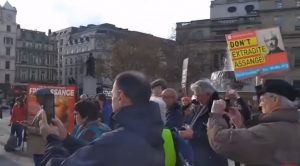
17 June 2022. BBC: Wikileaks founder Julian Assange’s extradition to the US has been approved by UK Home Secretary Priti Patel.
Mr Assange has 14 days to appeal over the decision, the Home Office said.
It said the courts found extradition would not be “incompatible with his human rights” and that while in the US “he will be treated appropriately”.
Mr Assange is wanted by the American authorities over documents leaked in 2010 and 2011, which the US says broke the law and endangered lives.
The Wikileaks documents related to the Iraq and Afghanistan wars.
The Australian is being held at Belmarsh prison in London after mounting a lengthy battle to avoid being extradited.
Extradition allows one country to ask another to hand over a suspect to face trial.
Responding to the home secretary’s order, Wikileaks confirmed it would appeal against her decision.
Mr Assange’s wife, Stella, said her husband had done “nothing wrong” and “he has committed no crime”.
“He is a journalist and a publisher, and he is being punished for doing his job,” she said.
In a press conference outside the British Embassy in New York, his brother Gabriel Shipton said they would take his appeal to the European Court of Human Rights if not successful in the UK’s High Court.
Media company Wikileaks is a whistle-blowing platform that publishes classified material provided by anonymous sources.
Analysis By Dominic Casciani, BBC’s Home and legal correspondent
This decision is the most important stage so far in Mr Assange’s long legal battle.
Judges in London have already ruled that the US’s request was lawful and that the American authorities would care for him properly in prison.
Now, the home secretary has carried out her role in the complicated legal process by signing off the US request.
Her officials said she was legally bound to do so because Mr Assange does not face the death penalty – nor does his case fall into the other narrow range of categories for her to refuse to approve the transfer.
In practice, this means there is nothing to stop Washington sending a jet to pick up Mr Assange – unless he can win on appeal.
If his lawyers cannot get a hearing back before judges in London, he could petition the European Court of Human Rights.
Ten years ago it ruled extradition to the US would not breach human rights – but expect the Wikileaks founder to try fresh arguments not heard back then.
In May 2019, while serving a jail sentence in the UK for breaching bail, the US justice department filed 17 charges against Mr Assange for violating the Espionage Act – alleging that material obtained by Wikileaks endangered lives.
Mr Assange’s legal team claimed classified documents published by Wikileaks, which related to the Iraq and Afghanistan wars, exposed US wrongdoing and were in the public interest.
Those documents revealed how the US military had killed hundreds of civilians in unreported incidents during the war in Afghanistan, while leaked Iraq war files showed 66,000 civilians had been killed, and prisoners tortured, by Iraqi forces.
Mr Assange has been in prison since he was removed from the Ecuadorian embassy in London in 2019 and arrested by British police, after Ecuador withdrew his asylum status.
He sought asylum in 2012 in the embassy, fearing US prosecution, and stayed there for seven years. He claimed he was a victim of human rights abuses and would face a life sentence if extradited.
The Supreme Court ruled in March that Mr Assange’s case raised no legal questions over assurances the US had given to the UK about how he was likely to be treated.
Previously UK judges blocked his extradition because of concerns about his mental health.
Amnesty International said enabling the extradition to take place “would put him at great risk and sends a chilling message to journalists”.
“Diplomatic assurances provided by the US that Assange will not be kept in solitary confinement cannot be taken on face value given previous history,” general secretary Agnes Callamard said.
Former government minister David Davis said he did not believe Mr Assange would have a fair trial in the US.
“This extradition treaty needs to be rewritten to give British and American citizens identical rights, unlike now,” he said.
A Home Office spokesperson said under the Extradition Act 2003 the secretary of state “must sign” an extradition order if there were “no grounds to prohibit the order being made”.
“The UK courts have not found that it would be oppressive, unjust or an abuse of process to extradite Mr Assange,” the Home Office added.




